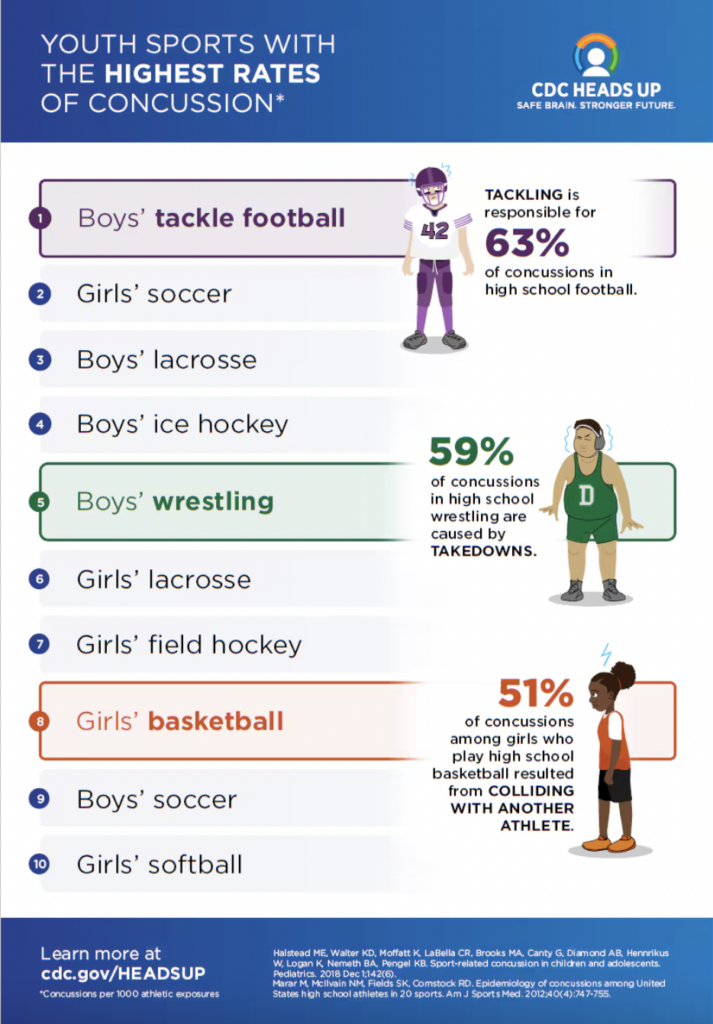With fall sports underway, there’s one health concern that often gets overlooked but is critically important: concussions. These traumatic brain injuries (TBIs) can affect anyone, but student-athletes are particularly at risk. For families with children in sports, understanding concussions and how to manage them can make a significant difference in long-term health.
At Professional Therapy Services, we’re committed to providing essential information and services to help families protect their athletes. In this article, we’ll cover what concussions are, why athletes are more prone to them, the importance of baseline testing, and ongoing screenings for optimal recovery.

How to Spot a Concussion and What Causes One?
Affecting over two million children and adolescents each year, a concussion is a type of traumatic brain injury (TBI) caused by a blow or jolt to the head or by a hit to the body that causes the brain to rapidly move back and forth within the skull. It’s possible to get a concussion after an injury that may not seem significant from the outside. Therefore, it is vitally important to know the symptoms:
- Headache
- Dizziness
- Nausea
- Confusion
- Blurred vision
- Sensitivity to light and noise
- Mood changes
- Memory problems or difficulty concentrating
Some of these are visible to others, and some are felt by the person with the concussion. Sometimes, the symptoms might not be apparent right away but show up in the days following the injury. While concussions are classified as “mild” TBIs, their effects—especially for young, developing brains—can be anything but mild.
Back-to-School Sports Season: Why the Risk Rises
As students gear up for fall sports like football, soccer, and cheerleading, the risk of concussions rises. High-contact and high-impact sports increase the likelihood of sustaining a head injury due to the nature of the physical exertion involved. Sports and recreational activities contribute to approximately 21% of all traumatic brain injuries among children and adolescents.
The risk increases due to:
- Frequent collisions and falls: Contact sports and high-intensity activities often involve hits to the head, either from another player, the ground, or equipment.
- Pressure to play through injuries: Athletes may feel pressure to “tough it out” after a hit, increasing their risk for a second injury before the brain has fully healed, leading to more severe consequences like “second impact syndrome.”
- Repetitive head impacts: Even small hits, if sustained frequently, can accumulate and cause long-term brain damage.
The 101 of Baseline Testing:
What is it?
Concussion baseline testing is a pre-season exam conducted by a healthcare provider, such as a Doctor of Physical Therapy, that measures an athlete’s balance and cognitive function. The idea is simple: it provides a snapshot of a person’s normal brain function when they are healthy. In the event of a concussion, healthcare professionals can compare post-injury results with baseline data to assess the severity of the injury and help guide recovery decisions.
Who should be tested?
Any athlete who participates in high—risk sports, regardless of age or experience level, is an ideal candidate for baseline testing. However, it’s not limited to athletes alone. Anyone who engages in activities with a high risk of falls, impacts, or jolts to the head, including recreational sports participants or individuals with physically demanding jobs, could benefit from baseline testing. Parents and coaches should ensure their young athletes receive a test before the start of each sports season.
How often should testing occur?
Michael Lane, Doctor of Physical Therapy and PTS Washington Outpatient Clinic Manager recommends that athletes, particularly those participating in contact sports, undergo baseline testing annually.
“Testing should be done in the preseason annually,” said Lane, “That way, if they ever did have a concussion, we could go back and retest.”
Since brain function can change as a person grows or improves their cognitive abilities, annual tests help ensure that the baseline reflects current capabilities. This is especially important for young athletes, whose brains are still developing and may show significant differences from one year to the next. If an injury does occur, this information helps tailor treatment plans specific to the individual and accelerate recovery.
Our Concussion Treatment Process at Professional Therapy Services (PTS)
Physical therapy plays a significant role in concussion recovery by addressing physical issues that often accompany the injury. The goal is to help the body and brain re-learn how to function harmoniously.
“You have to rest. But you also have to keep working and moving…guided exercises help to start that recovery process,” said Michael Lane.
A customized plan typically includes exercises to improve coordination, strength, and balance and relaxation techniques to reduce headaches and manage stress.
At Professional Therapy Services (PTS), we take a holistic approach to concussion management. We work closely with neurologists and other healthcare providers to ensure comprehensive care, focusing on restoring normal brain and body function.
Our process includes an initial assessment to review your baseline test results (if available), perform a post-injury evaluation, and create a treatment plan tailored to your specific symptoms. Concussions affect every person differently, and symptoms vary widely; our treatment plans are highly individualized.
Once an individual has recovered from a concussion, continued monitoring through post-concussion screenings is essential to determine whether the brain has returned to its pre-injury state. Re-establishing a baseline ensures that the individual is fully recovered and can safely return to physical activities without the risk of aggravating the injury.
Approximately 80% of PTS patients recover back to their baseline testing level in about three weeks to one month. Call PTS to request an appointment for a baseline test or post-concussion evaluation today!
